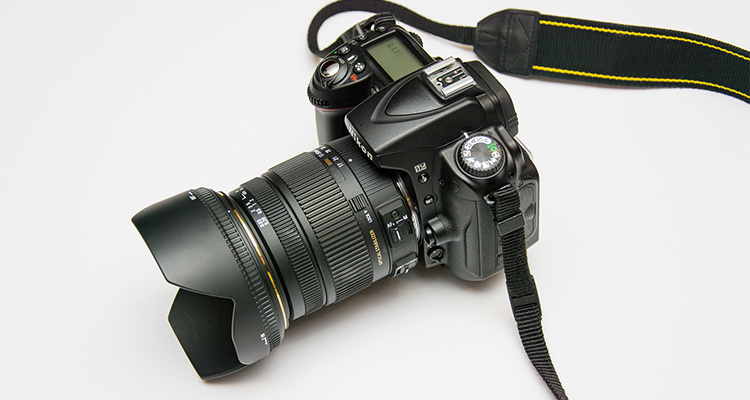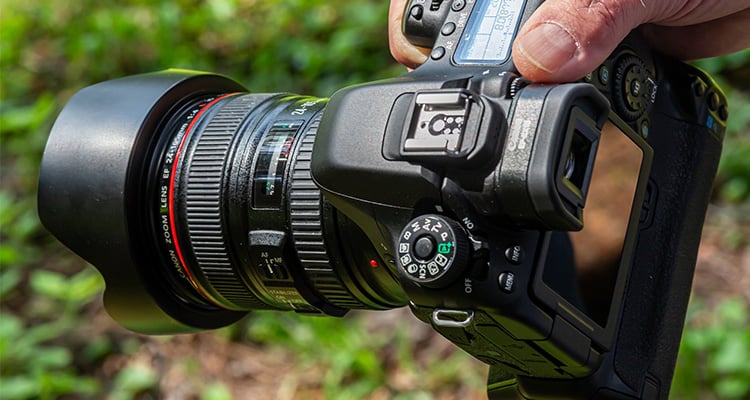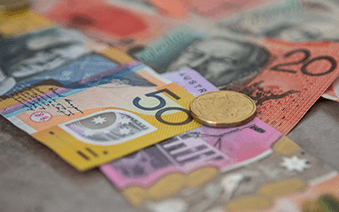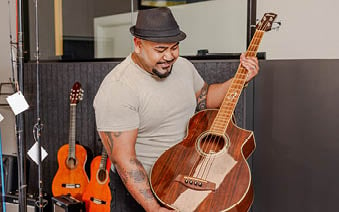There’s never a one-size-fits-all approach when it comes to cameras. You might want to try photography for the first time and aren’t too sure about where to start. If you’re a regular photographer looking at upgrading your SLR or DSLR camera, there are plenty of benefits from buying a second-hand camera and picking up some accessories.
With an incredible range of cameras available to pick up second-hand, it’s essential that you know what you’re looking for – and what to ask about – when you’re looking to buy.
| Table of contents |
|---|
When looking to buy a second-hand camera, the best way to look at it is that you’re trying to paint the best picture of the life the camera has lived. Was it used every single day by a professional photographer climbing cliffs and bumping into trees, or was it gathering a blanket of dust on a shelf with fewer photos taken than you’ve had birthdays?
Thinking of questions to ask when buying a second-hand camera ahead of time can help you learn about the history of the device, and whether the camera in your hands is worth buying or you should keep shopping around.
Wondering how to check a second-hand lens? The best way is to just try. If you’re in a store, ask the attendant if you could test out the camera to check the quality. What you’re looking for is whether the focus is working and whether there is any damage.
Taking a photo of a solid white or bright wall can help you inspect a test shot to see if there are any visible scratches appearing in the picture.
Also understand what the differences are between the lenses. Some of them aren’t built with a zoom, meaning you’ll have to physically move your body to the right distance to take your shot.
Make sure the auto-focus on the lens is also functional – try to focus on your hand, then focus somewhere distant to see if the lens can handle it.
When it comes to judging the extent of any potential damage of the camera by looking at the external body, there are a few things to keep an eye out for.
Checking the grips of the camera can tell you whether it’s been used a lot – these are replaceable if you’d rather start fresh but it’s a good indication of age.
Any dents on the casing can also be an indicator that gravity was not kind to this camera.
Look inside the DSLR camera and inspect – without touching – the mirror. This is what helps you see what the lens is seeing from the viewfinder. Take some continuous shots to see how quickly the camera can keep up.
If you’re purchasing a mirrorless camera, the viewfinder is digital – or mirrorless – so you won’t be hearing the mirror move up and down with every shot.
Wear and tear can happen on the body of the camera, including the doors and latches inside and out. Make sure that the doors protecting the memory card and battery lock securely and open smoothly. If they don’t fully lock, you might find your camera won’t work until it thinks the door is secure.
Batteries lose their charge over time. This can be a real hindrance when you’re out on a shoot and your battery decides to run out ten minutes after a full charge. A great way to test the life of a battery is by taking it home, giving it a full charge, and using it. See how many photos you can get from one charge.
If it’s underperforming, bring it back to the store and get a replacement if it is part of their store policy. At Cash Converters we offer a 90-day warranty on most items, so feel free to reach out to the store to ask questions. All items are checked and tested before sale.
Scratches on the LCD screen can be cosmetic only, and if you’re comfortable with relying on the eye piece to take your masterpiece you might be able to shave some of the price off for it depending on where you purchase the item.
If the screen also works as a touchpad, try to play with the settings to see if the different areas of the screen still register, checking the corners and in-between to see if the focus square is accurate. If there are scratches on the touchscreen, there’s a possibility it might also affect its accuracy.
The brightness of the screen can also be a big factor, seeing as you’ll be reliant on what that screen says when you take a shot. Bump up the brightness to full and see if it’s comfortably viewable. If you’re able to, test it outside to see if you’re able to see the screen in daylight.
Making sure that the sensor is intact means avoiding dark spots on a photo. This could be due to dust or dirt and in most cases can be fixed but depending on what you find it could also be caused by a scratched sensor. Just like the lens, taking a photo of a bright spot in the room can help pinpoint any potential problems to investigate.
If you’re buying a DSLR camera, there’s a great way of learning more about the history of the device. A camera might look pristine with no markings on the body, but it’s what’s underneath that’s important. The mechanics within can wear with plenty of use, and much like a car speedometer the camera shutter count can explain a lot.
How many times a camera has taken a photo can let you know whether it was used a little or a lot. There is no exact number but most DSLR cameras with a shutter count of over 100,000 means you’ll probably want to pass on that particular device.
This doesn’t mean that the camera is unusable but it does give you an indication of how much life it might have left – or why photos might start looking blurrier or darker because the shutter is showing its age.
To find the shutter count, a photo’s EXIF data usually contains the number but you’ll need to use a computer to check it. If you’re buying over the internet, ask the seller what the shutter count is.
Just because a camera isn’t the latest model, it doesn’t mean it’s not worth buying. Once the latest model is released, the value on older cameras drops significantly which is great news for second-hand buyers. Cameras aren’t a food product so there’s no ‘best before’ date to worry about. Some pro photographers hold onto their old cameras because they’re so reliable and well-built.
If you’re able to do some of the research ahead of time, have a look around for cameras that have the features you absolutely must have. If you’re planning to use this camera to make 4K videos, make sure that model can film in 4K. If you have an old Sony camera lens, it won’t fit a Canon or Nikon without a special adapter. See whether the features of that model are enough for you to do what you hope to achieve with the camera.
In some situations you might be buying from a private seller – from garage sales to meetups in a public place – and you may not get to take all of these precautions. While this is not too comforting, there are still valid questions and tests to do before you commit. Making sure it turns on and works is a bare minimum.
If you’re able to buy it from a second-hand store, like Cash Converters, you’ll most likely have the added benefit of a warranty that you get with your purchase. If it turns out the body stops working after a couple of months, you can bring it back to the reseller within the warranty period and either get your money back, get the item repaired, or get a credit towards something else.
The age-old question: second-hand Canon or Nikon? Well, it’s not so straightforward.
A second-hand Sony camera could be just what you need for your casual weekend photography days out. Some lens can fit other models with an adapter, and much like the A versus B arguments people are bound to have, it falls under preference. Get a better understanding of the brands and see if one jumps out at you.
If you’re not sure which camera is a good one, the best way to start is by talking to other photographers! These people live and breathe photography, and finding your fellow snappers can be a huge relief when it comes to asking these kind of questions. Look around online for places that hold meetups and join in, letting them know you’re hoping to get some tips for cameras and equipment that’ll fit your needs.
Like any pre-used piece of equipment, take as many precautions as you can by checking if there was enough care taken previously so that it doesn’t impact its everyday use from issues like exposure or water damage.
If you’ve got some old equipment that you no longer need, why not sell your gear for some extra cash? Selling old equipment in exchange for new gear makes the buying process much less of a sting to the wallet.
The information contained in this blog is general advice only and does not take your specific circumstance into consideration. You should assess your own financial position, objectives, and requirements before making any financial decisions.
Australian Credit Licence 391436. Subject to lending criteria being assessed. Check our TMD.
The age-old question: second-hand Canon or Nikon? Well, it’s not so straightforward.
A second-hand Sony camera could be just what you need for your casual weekend photography days out. Some lens can fit other models with an adapter, and much like the A versus B arguments people are bound to have, it falls under preference. Get a better understanding of the brands and see if one jumps out at you.
If you’re not sure which camera is a good one, the best way to start is by talking to other photographers! These people live and breathe photography, and finding your fellow snappers can be a huge relief when it comes to asking these kind of questions. Look around online for places that hold meetups and join in, letting them know you’re hoping to get some tips for cameras and equipment that’ll fit your needs.
Like any pre-used piece of equipment, take as many precautions as you can by checking if there was enough care taken previously so that it doesn’t impact its everyday use from issues like exposure or water damage.
If you’ve got some old equipment that you no longer need, why not sell your gear for some extra cash? Selling old equipment in exchange for new gear makes the buying process much less of a sting to the wallet.
The information contained in this blog is general advice only and does not take your specific circumstance into consideration. You should assess your own financial position, objectives, and requirements before making any financial decisions.
Australian Credit Licence 391436. Subject to lending criteria being assessed. Check our TMD.

Answering your questions about loans and staying savvy

Get more bang for your buck with these handy tips.

Need some advice that’s not about cash? We can help.